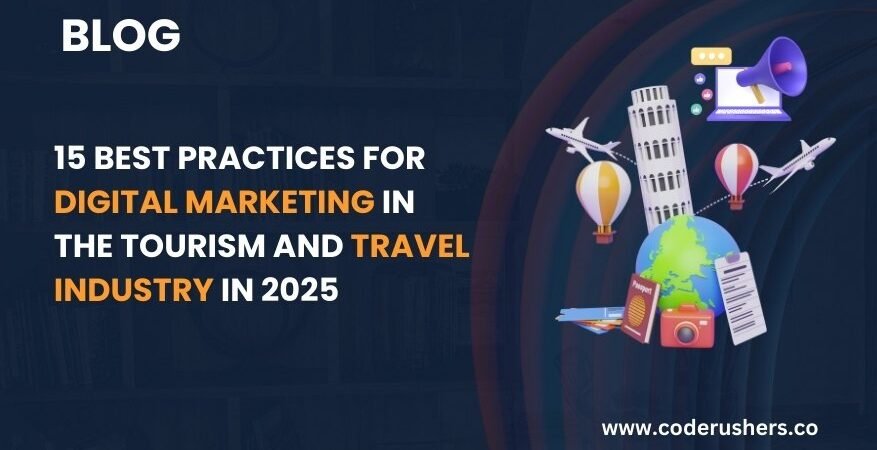
15 Best Practices for Digital Marketing in the Tourism and Travel Industry in 2025
In recent years, the tourism industry has witnessed rapid changes. One aspect that has become pivotal for most businesses, where competition is keen, is digital marketing. With the great number of tourists using websites to seek ideas of where to travel and book places, it is imperative to use best practices for digital marketing in tourism to draw potential clients. Whether through social media or the creation of a blog on the business’s website, these best practices for digital marketing in tourism help address the challenges of companies in enhancing their visibility, reaching their target audience, and increasing the number of bookings. How has Digital Marketing in Tourism Evolved? Notably, there has been a remarkable growth in digital marketing in tourism industry campaigns in the last ten years. Marketing in the field of tourism used to depend less on websites rather a lot on print media, promotional materials, and travel agents. However, with the development of social networking sites and the advances in technology, how people plan and book their holidays has drastically changed. Currently, digital marketing for the travel industry is an umbrella term that incorporates different strategies and tools that seek to promote businesses such as inbound tourism to any locality of the country in the best and fastest possible way. This means that advertising strategies can be designed with respect to specific groups of people or specific preferences resulting in better satisfaction of the customers. 15 Best Practices for Digital Marketing in Tourism Every travel business needs to adapt and learn the best practices for digital marketing in tourism. We present the 15 best strategies that you should adopt in 2025: 1. Invest in Personalization Personalization can be used to relate better with travelers in the current growing competitive tourism. Through data analytics, organizations can run very personalized marketing campaigns aimed at particular persons. Examples of such strategies are a customer’s previous records being used to provide similar travel offers to him/her or offers related to the customer’s interest like adventure tours or five-star hotels. The more relevant content most prospects are exposed to, the higher the chances that the prospects will engage, convert, and ultimately help cultivate customer loyalty. 2. Develop and Adopt Artificial Intelligence (AI) There is a very positive trend in customer service characteristics in the area of digital marketing in the tourism industry, due to the implementation of Artificial Intelligence (AI). For example, engaging AI tools like chatbots and virtual assistants on the websites of tourism businesses enables clients to receive instant assistance from customer support at any time of the day, any day of the week. These solutions which are artificial intelligence are capable of handling general questions, helping with the process of making a reservation, and providing recommendations to the user based on their preferences. This type of interaction is not just engaging the user to interact with the service more but also promoting satisfaction by answering issues sooner rather than later, without making the customer wait and increasing effectiveness at the same time. 3. Utilize Content Created by Users User-generated content or UGC is one of the best practices for digital marketing in tourism because it is a real real-life experience for travelers. It’s always a good idea to ask customers to post their travel selfies and stories on social media platforms to not only create trust but also improve brand awareness. UGC is a form of social proof for potential customers as it offers relatable and honest views about places and experiences. Organizations can include UGC in their campaigns, for instance, campaigns about photo competitions or hashtag competitions, to encourage travel enthusiasts to post their expeditions which helps in further promoting the brand and its connection to the people. 4. Stay Updated with Trends The travel industry is a dynamic one where practically everything changes from technology to travelers’ tastes and even the market. One of the most crucial aspects of keeping up with the competition and learning the digital marketing trends in 2025. This includes reading industry magazines, visiting travel exhibitions, and speaking to key people in the industry. This makes it possible for businesses to modify their plan to adjust to the present situation. Business organizations can apply current trends that meet the needs of today’s ever-changing consumers. 5. Apply Video Marketing Video marketing is here to stay and it is the most widely used digital content format around the world today especially for the travel industry. Professional digital marketing services will provide well-done video content, highlight places, tell interesting stories about different people, and even use testimonials from clients in an attractive manner. Videos are also a great way to narrate a story as the audience can far better understand the place through motion pictures rather than written or still ones. Video content whether it’s a snippet showcasing the best parts of the destination or an interactive 360-degree view relaying a lot of information has been found to boost engagement and conversion rates as it is easier for a viewer to retain and respond to what they have seen rather than what they have read. 6. Сontent Strategy and Development for Voice Optimization While the travel and tourism sector is looking to remain relevant in the content it produces, factors such as the increase in the usage of mobile devices with voice recognition, make optimizing content for mobile voice search critical for tourism business operators. Owing to the difference in functionalities, voice searching queries differ from the nuts and bolts of those who do text search books more on the inquiries. With information and the use of travel long-tail keywords, companies tend to rank better on voice search results. This optimization is aimed at making sure that whenever a user seeking travel guidance wants to know who or what to do, where or which business one should engage, your brand is accounted for as a top suggestion increasing the chance of that user being converted.
Explore More








